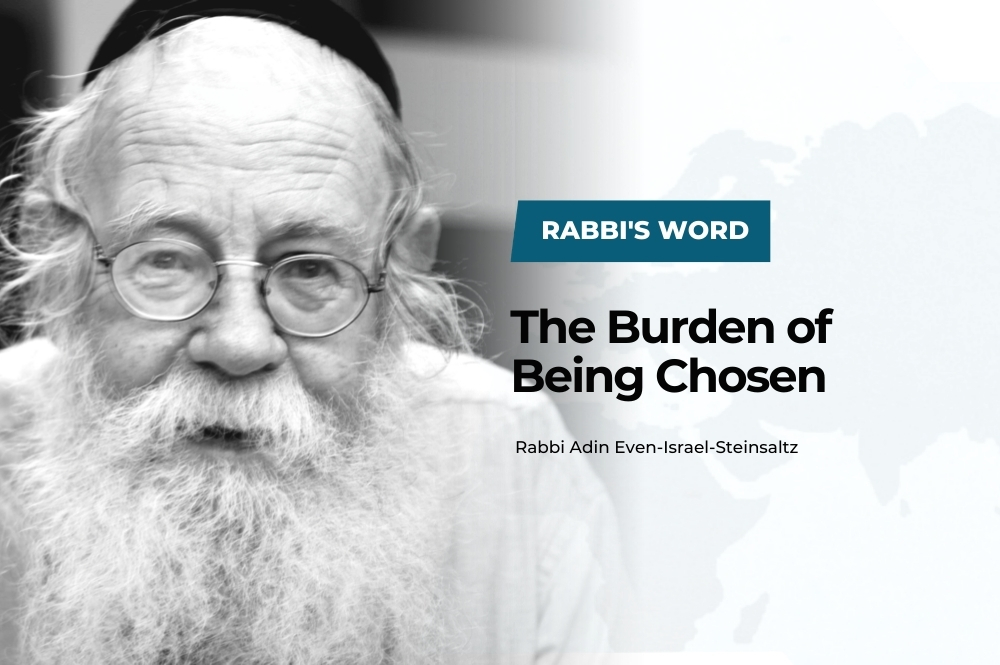
We continue cooperation with the institute of Rabbi Adin Even-Israel Steinsaltz and publish specially prepared material for the communities of the EAJC members.
Dear reader,
To our greatest regret, we publish this article after the death of Rabbi Steinsaltz, one of the greatest philosophers of our generation, a scientist and a Hasid. Let his memory be blessed. Without any doubt, we are yet to realize and discover the real scale of his personality in the years to come. This article slightly extends the usual standards; however, the relevance of its topic prevails over these limitations.
Lia Lea Shvets, Steinsaltz Centre
The problem of the relationship between the Jews and the other nations cannot be scaled down to the questions of status or antisemitism only. First and foremost, it is an internal problem that has to do with an attempt to find our place amongst the nations and a search for the meaning of solitude of Jews throughout history.
The surrounding world may be described as a mirror, in which, since ancient times, the Jews have been observing themselves, continually revealing something new. Sometimes, the reflection is distorted and creates a comic image. However, this distortion is not accidental, as the problem of the place of Jews between the nations is our own, rather than anybody else’s.
I have repeatedly noted that antisemitism is, in its essence, ambivalent. In other words, hostility, contempt and disdain are only one side of the coin. After all, what is considered inconsequential, unimportant or not holding any potential, is simply ignored, and we tend not to think or talk about it.
This duality is particularly understandable among adherents of monotheistic religions. Indeed, not only Christianity and Islam have derived and developed from Judaism, but also they are conceptually related to it since they recognize the doctrine of chosenness of the Jews. Although their acceptance of the ideas of Judaism is incomplete and inconsistent, they never deny it being their predecessor. Both religions recognize the Jews as the ‘chosen people’, responsible for the transmission of divine revelation. Thus, on the one hand, they are based on the Jewish religious tradition and rooted in it, yet, on the other hand, having diverged from Judaism forces them to deny it, as well as devaluate its image and significance, at least in the present, despite being unable to revoke its primary value in the past. Actual Jews and Judaism that continue to exist are truly a sore spot for monotheistic religions.
Paradoxically, antagonism and hostility can be interpreted both as an expression of unfulfilled love and respect, as well as a disappointment that Jews still exist. Had they disappeared in time, they would be perceived completely differently – as an object of worship and gratitude. But here is a little bump in the road – we are still alive! Unfulfilled love creates a charge of hostility, which is at least equal in strength to its original potential.
The self-esteem of a nation can be compared to the self-esteem of an individual: they tend to forgive themselves for their imperfections while extolling their real and imaginary virtues, considering themselves better than everyone else. This may only become a source of hostility for the surrounding people in case they have a reason to believe that such claims are justified. If one claims to be chosen, he can be ridiculed; whereas if one is suspected of being chosen, he becomes hated.
This is the reason why any negative trait of the Jews (no matter, real or fictitious, in this case) is perceived so harshly and exaggeratedly, and the reaction to any of their actions is so acute. A Jew who stole something or told a lie attracts increased attention not only because of some underlying hostility towards him but also because of the high expectations, based on great and even exaggerated respect for his personal qualities and merits. The higher is the expectation, the greater the disappointment.
There is a phenomenon of unconscious correction in evaluation. If a certain people is considered barbaric, inferior or wild, then any unexpected positive trait that an individual of that origin would have, would be viewed as an achievement and a sign of great virtue. Any good deed would be recognized as an act of heroism, and anything that is generally considered ‘normal’, for the representatives of this group would be something to take pride in.
There is an entirely opposite attitude towards those whose chosenness is taken seriously. This double standard is clearly manifested in the attitude towards the modern state of Israel: it is being disapproved and blamed for any action that would be perceived as normative in relation to any other country. Interpreting it as antisemitism of the surrounding world is only a superficial view of the situation. A more in-depth look would reveal that on a conscious or an unconscious level, people expect of a Jew and the Jewish people much more than the norm. Being average is not enough for the Jews; they must be the best. Hence the judgementalism in the perception.
There is another aspect to this unique attitude towards the Jews, which is unrelated to the theological background. Over the last two thousand years, most Jews have been living among other nations as a minority. Any minority may suffer from various forms of xenophobia. As individuals and as a community, Jews have been an easier target for any type of aggression. Usually, minorities living in a foreign land have a country of origin that can support them, giving them some sort of status. Of course, it might not be strong enough to protect one from hatred and persecution, or be too remote, or suffer from internal problems that prevent it from protecting its citizens residing in foreign countries. Still, the restraining influence of fear of retaliation or other negative consequences has often protected minorities from the unleashing anger of their enemies. The Jews have never had such support; therefore, they have always been more vulnerable than other peoples.
Yet another aspect is the apartness of the Jews and the fact that they are too different from others. They feel like strangers and aliens, even in countries where they have been living for millennia. Therefore, it is not surprising that the Jews have always been the first to blame for all the troubles and disasters in various parts of the world. The real underlying reason has been the natural human desire to find someone responsible for their problems, preferably outside the community. Of course, there were also some rational reasons for the hatred of Jews. A debtor does not favour his lender; the poor neighbours are not fond of their successful counterpart; a loser does not tolerate the one who serves as a living reminder of his own failure. However, all this is secondary to the above two aspects that have turned the omnipresent Jews into an easy target thanks to their peculiarity and helplessness.
As a result of that, they have become the most precise sensor of the ongoing inner processes in the countries they live in.
Just as a more sensitive device picks up sound earlier than other, worse-tuned ones, so the Jews suffer from the problems and misfortunes of the world sooner and more profoundly than other peoples. Moreover, the fact of the persecution of Jews is a symptom of a systemic disease of the state organism. We have already explained why they are the first to suffer, but the root of the problem is not antisemitism, but rather the crisis the country is facing. The rioters or their inspirers are unlikely to realise this. They can be sincerely convinced that the truth is on their side, but this does not change the fact that the persecution and the blame of the Jews means that the country is affected by a serious disease. Hatred of Jews is only the first and the most apparent symptom, nothing more. Sometimes the real reason for another wave of anti-Jewish attacks is obvious, but sometimes it is difficult to determine, which makes it look like an independent issue. However, this is only a false appearance, and it would take time to expose the truth behind it.
Such perspective on the historical processes allows us to recognize this phenomenon in multiple cases, and not necessarily in the form of cause-and-effect relationships. A general decline inevitably accompanies the exile of Jews or their mass exodus from the once-powerful regimes and large states, the loss of their status, and pogroms. Even without going deep into the theological issues of retribution and revenge, a correlation between the socio-economic processes of decline and anti-Semitic outbursts (examples can be found in the full article on the Steinsaltz Centre’s website).
We may also note the opposite trend: the decision once taken by England to allow Jews into its territory was associated with its general prosperity. In this case, as well, it is not necessarily a case of a direct cause-and-effect relationship, and we cannot assert that the state’s empowerment can be assigned exclusively to the Jews. But the same processes that paved the way to the greatness of the British Empire also opened it up to Jews. Likewise, the increase in the US political influence and economic power has been accompanied by unprecedentedly high levels of Jewish immigration to this country. One can question the role of Jews in its formation, but the connection between the above processes is undoubtful.
Thus, the status of Jews in the world constitutes a finely tuned sensor of changes in the countries they reside in. The more they are hated and persecuted, the more severe the problems of that country. Those might be of quite a mundane and practical kind, such as economic crises, wars, and some others. However, they can also be more subtle, such as, for instance, isolationism, loss of initiative, detachment of a society, ideological or religious coercion. Their consequences affect the Jews first, and later, in a more explicit and expanded form, all the others. According to Isaiah (Isaiah: 53), the bruised, humiliated and suffering servant of G-d bears the troubles of other people: the sicker they are, the greater is his pain.
The spiritual service of the suffering servant and his inner growth and purification by suffering is a separate topic. But whatever is in his power to improve his situation has a beneficial influence on the others. It is not about the calling of the Jews to be “a beacon to the nations,” or their leader. The meaning of their existence is not in the role that they play for the others; their primary duty is to be themselves. The healthier, the more powerful and spiritually grown they are, the more benefit they bring to all humankind. The surrounding nations may understand that they should help and support them in all possible ways when they can. A burning torch does not shine because it sees a calling in it: it just burns as this is the only way of its self-expression, but that is also the reason why it brings light to those around it.



